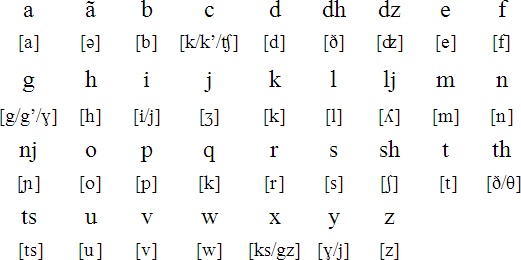Aromanian is an Eastern Romance language spoken in Greece, Albania, North Macedonia, Romania, Bulgaria and Serbia by about 300,000 people. Aromanian is closely related to Romanian, though it contains more vocabulary of Greek origin, while Romanian has absorbed a lot of vocabulary from Slavic languages and Hungarian.
The Aromanians are known by different names, including Vlasi (Macedonian and Serbian), Vlahi (Greek), Ulahlar (Turkish), Vllehë or Çobani (Albanian), Vlachs (English), Wlachen or Walachen (German) and Valaques (French). All of these words come from the Greek Βλάχοι (vlahoi - shepherds). The Serbs call the Aromanians Tsintsari, and they are known as Macedo-Romãni by the Romanians. They call themselves Armãnji, and their language armãneashti or limbã armãneascã.
The earliest known examples of written Aromanian are manuscripts of the Patriarch Fotius dating from around 860-870 AD, and manuscripts written by St. Naum of Ohrid at about the same time. During the late 18th century many books in Aromanian were published, all written in the Greek alphabet. Unfortunately many of the early works in Aromanian were burnt during wars between 1750-1788.
The first person to publish material in Aromanian in the Latin alphabet was probably Dr. Ioryi Constantin Roja at the beginning of the 19th century. During the 1980s a new Aromanian spelling system began to emerge and has been adopted in most countries where Aromanian is spoken, with the exception of Greece and Romania, where the old spelling systems are still used. The new system, which eliminates all the accented letters, with the exception of ã, was proposed by four Aromanian writers and first published in 1985.
Aromanian has some official status in the Republic of North Macedonia and is taught in some primary schools there as an optional subject. Aromanian speakers in North Macedonia have the right to use Aromanian in court, and since 2006 Aromanian has been the second official language (after Macedonian) in the city of Kruševo (Crushuva).
Aromanian dialects include Cipan, Vargarean, Sarbean, Farsilotu, Gramustean and Pindean.

Download an alphabet chart for Aromenian (Excel)
Tuti iatsãli umineshtsã s-fac liberi shi egali la nãmuzea shi-ndrepturli. Eali suntu hãrziti cu fichiri shi sinidisi shi lipseashti un cu alantu sh-si poartã tu duhlu-a frãtsãljiljei.
A recording of this text by Julijan Jovanovic
All human beings are born free and equal in dignity and rights. They are endowed with reason and conscience and should act towards one another in a spirit of brotherhood.
(Article 1 of the Universal Declaration of Human Rights)
Hear an Armonanian version of The Little Prince:
Information about Aromanian | Phrases | Numbers | Tower of Babel
Information about the Aromanian language and people
http://en.wikipedia.org/wiki/Aromanian_language
http://www.mlahanas.de/Greece/History/Aromanians.html
http://www.aromanii.ro
http://www.scd-lunjina.org/index.php/arman
http://www.vlahoi.net
Aromanian - English dictionary
https://www.freelang.net/online/aromanian.php
http://aromanii.ro/aromanii/dictionar.php
Aromanian phrases
http://www.liquisearch.com/aromanian_language/common_words_and_phrases
https://www.lingetscript.com/2011/01/various-aromanian-phrases.html
On the standardization of the Aromanian system of writing, by Tiberius Cunia
http://www.farsarotul.org/nl23_3.htm
http://armanami.org/blog/
Online Aromanian radio
http://www.rri.ro
Aromanian associations
http://www.farsarotul.org
http://makedonarman-council.org/
Aragonese, Aranese, Aromanian, Asturian, Catalan, Corsican, Dalmatian, Emilian-Romagnol, Extremaduran, Fala, Franco-Provençal, French, Friulian, Galician, Gallo, Gascon, Genoese, Guernésiais, Istro-Romanian, Istriot, Italian, Jèrriais, Ladino, Ladin, Ligurian, Lombard, Lorrain, Megleno-Romanian, Mirandese, Moldovan, Monégasque, Mozarabic, Neapolitan, Occitan, Occitan (Auvergnat), Occitan (Languedocien), Occitan (Limousin), Occitan (Provençal), Picard, Piedmontese, Portuguese, Romanian, Romansh, Sardinian, Sicilian, Spanish, Valencian, Venetian, Walloon
Languages written with the Latin alphabet
Page last modified: 12.06.23
[top]
You can support this site by Buying Me A Coffee, and if you like what you see on this page, you can use the buttons below to share it with people you know.

If you like this site and find it useful, you can support it by making a donation via PayPal or Patreon, or by contributing in other ways. Omniglot is how I make my living.
Note: all links on this site to Amazon.com, Amazon.co.uk
and Amazon.fr
are affiliate links. This means I earn a commission if you click on any of them and buy something. So by clicking on these links you can help to support this site.
[top]